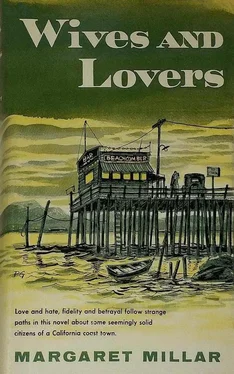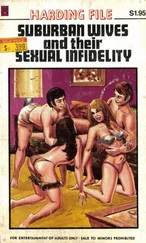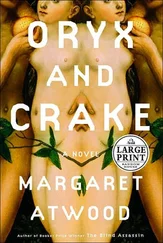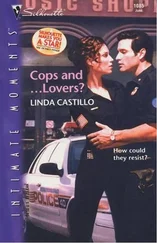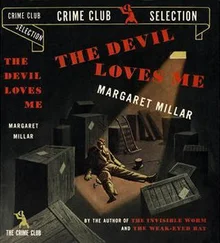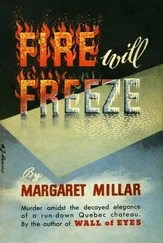He forced himself to think of Mrs. Haley. When she first came to the office she had the holes in her teeth plugged with candle wax. She had all her children with her, for moral support, and Gordon had given them each a ride in the dental chair, two at a time.
Thinking of Mrs. Haley, he was sure that he hated this pretentious little town. It wore culture on its head like an ageing, kittenish dowager, wearing a picture hat with artificial roses, and needing a good hot bath.
He was glad to be leaving.
The only place they could find open was the lunch room across from the S. P. station. The counter was already half-filled with railroad men. They talked back and forth to each other and to the two waitresses. One of the men took a snapshot out of his wallet and passed it to the stout waitress.
“Gee whiz,” she exclaimed. “They’re cute! They’re as cute as bugs! You musta had a good-looking iceman.” She handed the picture to Ruby. “Pass it along, will you? It’s Joe’s twins.”
Joe’s twins were standing in a playpen wearing identical expressions of surprise.
“They are cute,” Ruby said. “Aren’t they, Gordon?”
Gordon glanced briefly at the picture and passed it on.
“They don’t like to have their pictures took,” Joe explained. “Maybe scared of the camera.”
“G’wan,” said the waitress. “You probably beat them. G’wan, admit it.”
“You’re a great kidder,” Joe said.
The waitress brought Ruby and Gordon some scrambled eggs. She had a good-natured, careless attitude that reminded Gordon of Hazel. He hadn’t, until that moment, thought of trying to get some money through Hazel. Hazel wouldn’t have any herself, not enough anyway, but if he gave her a check she might be able to cash it through George Anderson.
Without tasting his eggs, he went to the phone booth and dialed Hazel’s number.
George didn’t get up till noon on Sundays, and when the phone started ringing before eight he struggled out of bed, cursing.
“George? It’s Hazel. Are you all right?”
“Why shouldn’t I be?”
“Oh, I don’t know. Sometimes you take things like last night kind of hard and I wanted to make sure you were feeling all right because I’ve got something important to ask you.”
“Ask ahead.”
“I need some money for a friend of mine. Today. Right now.”
“How much?”
“Five hundred dollars.”
“You give me a pain,” George said.
“Listen to the deal first before you blow a fuse.”
“I’m listening.”
“Well, this friend of mine is going on a holiday. He intended to leave tomorrow but he’s got this chance to leave today and he needs five hundred dollars. He’s giving me a check and I’d like you to lend me the money so I can give it to him, and then tomorrow morning I’ll cash the check at the bank and pay you back. See?”
“It sounds damned peculiar. I can scare up the money, maybe, but why the complications?”
“Because. Will you do it, George?”
“No.”
“For heaven’s sake, why not?”
“If your friend wants five hundred dollars bring him over here. Then if he has an honest face and a reasonable balance in his bank book, I’ll cash a check for him.”
“No. It’s better the way I suggested.”
“Why?”
“Well, he has a joint account with his wife, see, and his wife doesn’t know yet that he’s going away. If the check’s made out to me I can be at the bank sharp at ten when the doors open, and if I see her there I can just push ahead of her.”
“Holy catfish.”
“That’s what he told me,” Hazel said, stubbornly. “If his wife suspects that he’s going away she might try and draw out all the money before this check can be cashed. Now do you understand?”
“It sounds like a perfect set-up for you to keep your nose out of.”
“Wait a minute, I want to close the dining-room door. I think Josephine and Harold are getting up.” There was a pause. “It’s all right now. They can’t hear.”
“What difference would it make if they did?”
“This friend of mine doesn’t want everybody to know his business.”
“He’s running out on his wife, is that it?”
“Yes.”
“Why?”
“My gosh, George, do you have to know everything?”
“Five hundred bucks,” George said, “is five hundred bucks.”
“He’s got his reasons.”
“I hope you know what you’re doing, aiding and abetting whatever you’re aiding and abetting.”
“I know, all right.” She thought how surprised he would be if he knew too. She felt a little sorry for George that he should have to finance Ruby’s and Gordon’s trip, but it was, actually, for his own good. Eventually he’d be glad and realize that Ruby would never have married him anyway. “It’s a matter of principle,” she said, her conscience leaping slightly. “Will you get the money, George?”
“I guess I can try.”
“You’ll do it. You have hundreds of friends.”
“I can’t think of a better way of losing them.”
“Everyone’s going to be paid back. This friend of mine is a very respectable man. Just because he’s leaving his wife doesn’t mean he’s a crook.”
“All right. I said I’d try.”
“Shall I pick it up at your apartment?”
“No.” He didn’t want Hazel to see the apartment in its present condition. It hadn’t been cleaned for a month. “How about meeting me at the Beachcomber?”
“When?”
“In an hour or so.”
“I’ll be there.”
“I still hope you know what you’re doing,” George said gloomily.
“You’re always such a pessimist where money’s concerned.”
“Five hundred bucks is—”
“Yes, I know, George. Anyway, this is very nice of you. I appreciate it. I’ll do something for you someday.”
“Cut the violins,” George said and hung up.
He got dressed and made his breakfast. This was the part of living alone that he hated most, getting up to an empty apartment and having to make his own breakfast. When they were married Hazel had always cooked very elaborate breakfasts. She told everyone that George had a large frame to fill, and she filled it, in the mornings, with hot cakes and sausages and fried potatoes and blueberry muffins.
The kitchen was a mess and the refrigerator smelled sour, jammed with odds and ends of stale food. He managed to find three eggs, one of them cracked. He fried them while the coffee percolated. Some day he’d have to clean out the refrigerator but he didn’t know how to go about it. It seemed kind of drastic to take everything out, and he wondered if women had some special easy system for cleaning out refrigerators, and what they did about the smell.
While he was drinking his coffee he counted the money in his wallet. Forty-seven dollars. That meant shopping around for the difference, four hundred and fifty-three dollars. There was some cash in the safe at the Beachcomber but he had made it a rule not to touch any of it and not to borrow any money from the till even for twenty-four hours. It was the kind of thing that, once started, was hard to stop, and he was afraid his partners wouldn’t like it if they found out.
He thought of two men who would be likely to have quite a bit of cash over a Sunday. One was a small-time gambler who played poker every Saturday night in the back of a Chinese herb shop. The gambler lived with his sister who didn’t approve of gambling. She took his winnings, when she could find them, and gave them to the church and to relatives. She had become so skillful at finding his hiding places that the gambler was occasionally compelled to leave his money with George over the weekend.
Читать дальше
